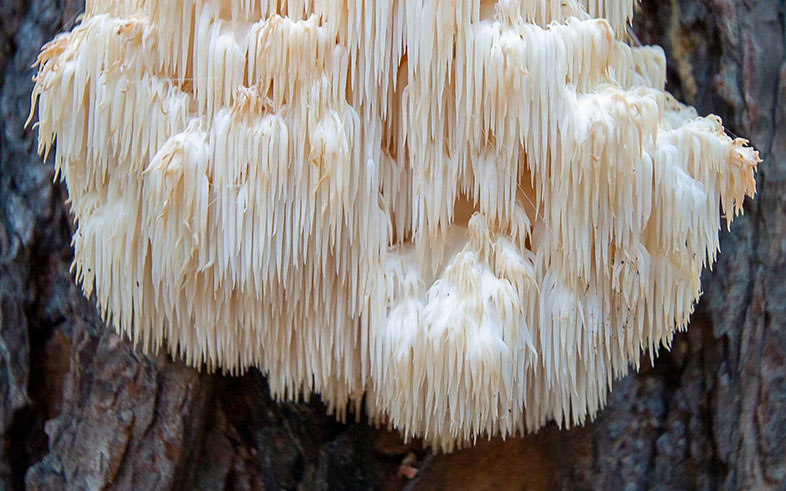Lion’s Mane Mushroom: The Brain-Boosting, Mood-Lifting Super Mushroom
In the realm of natural remedies and alternative medicine, mushrooms are having a moment. From the well-known benefits of shiitake and reishi to the rising stars like turkey tail, these fascinating fungi offer a treasure trove of potential health benefits.
Among them, there’s one mushroom that stands out for its unique appearance and its potential to revolutionize how we think about brain health, mood, and overall well-being: Lion’s Mane (Hericium erinaceus).
What is Lion’s Mane Mushroom?
With its cascading tendrils that strikingly resemble a lion’s mane, this wondrous mushroom is as visually captivating as its name suggests. Found throughout North America, Asia, and Europe, Lion’s Mane is both a culinary delicacy and a potent medicinal mushroom. Its delicate, savory flavor (often compared to seafood) makes it a sought-after gourmet ingredient.
For centuries, it has played a significant role in traditional Chinese medicine, used to enhance digestion, boost immunity, and support cognitive brain function.
Other Names
Lion’s Mane goes by many intriguing names, including Bearded Tooth Fungus, Hedgehog Mushroom, Satyr’s Beard, and Yamabushitake (its Japanese name). Its scientific name, Hericium erinaceus, further alludes to its appearance.
Growing Conditions
You might spot Lion’s Mane growing on dead or decaying hardwood trees, particularly in late summer and fall. If you happen upon a wild Lion’s Mane, be mindful of responsible and sustainable foraging practices. Many enthusiasts also opt to cultivate their own at home.
Potential Health Benefits of Lion’s Mane Mushroom
Modern science is catching up to what traditional healers have long suspected – within this shaggy mushroom lie compounds that could unlock new frontiers in promoting health and well-being. Here’s a closer look at the major areas of research:
Brain Health, Cognitive Function & Nerve Growth Factor (NGF)
- Protection against Cognitive Decline: One of the most compelling aspects of Lion’s Mane research involves its potential to shield our brains from age-related cognitive decline. Several studies have shown promise for individuals with mild cognitive impairment, with notable improvements in memory and cognitive function after consuming Lion’s Mane.
- Memory and Focus Enhancement: Beyond protection, Lion’s Mane might act as a natural “brain booster.” Research suggests it could improve concentration, memory recall, and overall cognitive performance in healthy adults.
- Mood Support: Emerging research hints at Lion’s Mane’s potential role in managing depression and anxiety. Studies involving individuals with depressive disorders have indicated reductions in symptoms, with some researchers theorizing the effects might stem from Lion’s Mane’s impact on brain health and inflammation.
- NGF: The Key Connection: Nerve Growth Factor (NGF) is a vital protein that plays a key role in the growth, maintenance, and survival of neurons (brain cells). Remarkably, Lion’s Mane contains unique compounds called hericenones and erinacines, which have been found to stimulate Nerve Growth Factor synthesis and production in laboratory studies. This suggests potential benefits for brain repair, nerve regeneration, and overall cognitive health.
Immune System, Inflammation, and Gut Health
- Immune System Supercharger: Lion’s Mane may act as a natural shield for your immune system. Research suggests that it can stimulate the activity of immune cells, potentially helping our bodies fight off infections and diseases more effectively.
- Inflammation Fighter: Chronic inflammation is a major contributor to numerous health conditions. Research indicates that Lion’s Mane could exert anti-inflammatory effects, possibly stemming from its antioxidant properties. This could have far-reaching benefits for various conditions, from heart health to managing chronic pain.
- Gut Health Supporter: Your gut microbiome plays a significant role in overall health. While this area of research is still developing, some test-tube studies suggest that Lion’s Mane could encourage the growth of beneficial gut bacteria and potentially aid in protecting against stomach ulcers.
Other Potential Benefits
- Heart Health: Some studies indicate that Lion’s Mane may improve blood lipid profiles and support cardiovascular health. However, more research (especially human trials) is needed to fully understand these potential benefits.
- Blood Sugar Management: Animal models suggest a potential role for Lion’s Mane in managing blood sugar levels, a promising avenue for further research in diabetes management.
- Wound Healing: Preliminary research hints at the possibility of Lion’s Mane helping to accelerate wound healing, though more rigorous studies are needed.
How to Take Lion’s Mane
Lion’s Mane is remarkably versatile. Here are the most popular ways to incorporate it into your routine:
- Food: Fresh Lion’s Mane is a culinary treat, especially when sauteed in a bit of butter with your favorite herbs and spices. Its delicate flavor is often described as similar to lobster or crab, making it a delicious addition to seafood dishes.
- Powders: Lion’s Mane powders are easy to add to everything from your morning smoothie or coffee to soups and stews. They offer an earthy, subtle flavor boost and a dose of potential benefits.
- Extracts: Liquid extracts are a concentrated and potent way to consume Lion’s Mane. They’re often considered the most effective form for those aiming to maximize their intake of beneficial compounds.
- Supplements: Capsules and tablets offer a convenient, pre-measured option. Several reputable brands like Mushroom Wisdom (maker of Amyloban 3399) and Host Defense Mushrooms specialize in high-quality Lion’s Mane supplements. You can also take Lion’s Mane mushroom gummies made by Gaia Herbs.
- Tea: Relax with a warm cup of Lion’s Mane Mushroom Tea by Bravo Tea and enjoy both the subtle flavor and its potential benefits.
Dosage Considerations: The ideal dosage will vary depending on the form of Lion’s Mane you choose and individual factors. Always follow package directions on any dietary supplements used, or consult with a knowledgeable healthcare professional for personalized guidance.
Are there Any Side Effects of Lion’s Mane?
Lion’s Mane mushroom is generally considered safe for most individuals. However, some people might experience mild digestive discomfort, especially when first starting to take it. It’s essential to be aware of potential allergies, particularly if you have a known sensitivity to mushrooms.
As with any herbal supplement, choosing products from reputable companies is crucial to ensure quality and purity.
A Note on Supplements
If you’re looking to try Lion’s Mane supplements, keep these insights in mind:
- Extraction Methods Matter: Lion’s Mane contains both water-soluble and alcohol-soluble bioactive compounds. A dual-extraction process (water and alcohol) helps ensure you get the full spectrum of benefits.
- Sourcing and Quality: Choose brands that emphasize organic cultivation, rigorous testing, and transparency about the extraction methods they use.
Lion’s Mane – A Promising Natural Ally
With its unique appearance and fascinating potential, Lion’s Mane truly stands out among medicinal mushrooms. While more large-scale human studies are needed to confirm all its benefits, the existing body of research paints a very promising picture.
Whether you enjoy it fresh for its culinary appeal, or add it to your health regimen in powder, extract, or supplement form, Lion’s Mane offers the potential to nourish your body and mind.
As with any dietary supplement, it’s always wise to consult with your healthcare provider before starting a new routine, especially if you have any existing health conditions or are taking medications.
FAQs About Lion’s Mane Mushrooms
What does Lion’s Mane mushroom do for you?
Research suggests Lion’s Mane has numerous potential benefits. These include supporting brain health, cognitive function, mood balance, a healthy immune system, and potentially aiding in gut health and inflammation management.
What are the negative effects of Lion’s Mane?
Lion’s Mane is generally considered safe for most people. However, some individuals might experience mild stomach upset, especially when initially starting to use it. If you’re prone to mushroom allergies, it’s best to proceed with caution.
Is it safe to take Lion’s Mane every day?
For most healthy adults, daily use of Lion’s Mane is likely safe when staying within recommended dosages. However, it’s always a good idea to talk to your doctor, especially if you take other medications or have underlying health conditions.
Is Lion’s Mane considered a drug?
No, Lion’s Mane is a naturally occurring mushroom. While sometimes referred to as Lion’s Mane medicinal mushroom, it’s classified as a dietary supplement, not a pharmaceutical drug.
Is it OK to eat Lion’s Mane mushroom?
Yes! Fresh Lion’s Mane mushroom is a culinary delicacy with a delicate, savory flavor. It’s often compared to seafood and is delicious sauteed or used in soups and sauces.
What are the benefits of taking Lion’s Mane?
The primary potential benefits of Lion’s Mane include:
- Protecting against age-related cognitive decline
- Enhancing memory, focus, and overall brainpower
- Supporting mood balance and potentially easing anxiety and depression
- Boosting the immune system
- Reducing inflammation within the body
Who should NOT take Lion’s Mane?
Avoid Lion’s Mane if you have a known allergy to mushrooms. It’s best to consult your doctor before starting Lion’s Mane if you’re pregnant, breastfeeding, or have any serious health conditions.
Does Lion’s Mane work immediately?
While some people may report subtle effects quickly, the full benefits of Lion’s Mane often take time to manifest. Consistent use over several weeks or months may be needed for noticeable results.
Important Reminder: The information in this FAQ and the article is intended for educational purposes. It is not a substitute for professional medical advice. Consult with your healthcare provider before incorporating Lion’s Mane mushrooms into your wellness routine.

Adelena completed her undergraduate degree at Buffalo State University, where she majored in Health and Wellness along with a Pre-Medicine discipline. She graduated with honors along with many scholar athlete awards. She then went on to Southwest College of Naturopathic Medicine in Tempe, Arizona, where she successfully completed her Doctorate in Naturopathic Medicine. Adelena always had a passion for alternative/integrative medicine as she was raised amongst chiropractors and grew up in Europe.
Many of the patients that Adelena works with, typically present with a long list of medications, previously diagnosed chronic conditions and having worked with many other practitioners in the past without success. Their goals are to evaluate their health and find the reason they may feel the way they do.
She aids patients in finding the root cause of their concerns through state of the art diagnostic testing. With this, it allows her to educate patients about what is going on in their body at a cellular level and adjust certain aspects of their diet and lifestyle. I particularly specialize in chronic conditions and hormone management.
As someone who has been through the traditional medical system, Adelena strives to provide exceptional care and help you take your life into your own hands. With that you can achieve optimal wellness and feel like yourself again.



